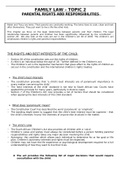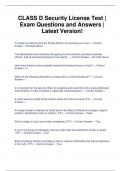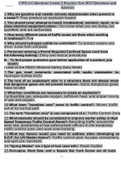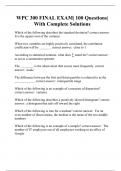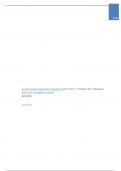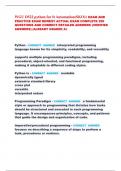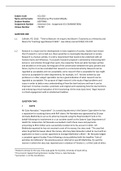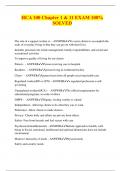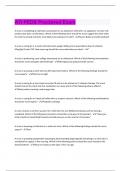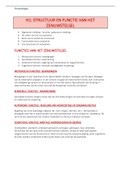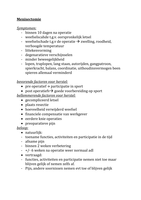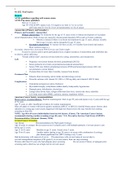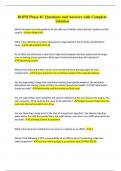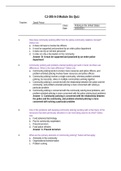FAMILY LAW – TOPIC 2
PARENTAL RIGHTS ABD RESPONSIBILITIES
Robin and Tracy are twins. Their parents are constantly working. The twins have to cook, clean and look
after themselves. They just want to live a life like other kids.
This chapter we focus on the legal relationship between parents and their children. The legal
relationship between parents and children has been significantly influenced by the constitution –
section 28. We also look at the rules set out in the Children’s act 38 of 2005. The children’s act
emphasizes children’s rights and parental responsibilities.
THE RIGHTS AND BEST INTERESTS OF THE CHILD
Section 28 of the constitution sets out the rights of children.
A child is an individual below the age of 18 – further defined in the Children’s act.
The Children’s act is the legislative mechanism that gives affect to the rights of children as
set out in the constitution and the international children’s rights treaties.
The child’s best interests
The constitution provides that ‘a child’s best interests are of paramount importance in
every matter concerning the child.’
The ‘best interests of the child’ standard is not new to South African law. Courts have
applied this principle for many years, particularly in divorce cases.
Section 7 of the Children’s Act now provides a list of factors that should be considered
when applying the best interests of the child standard.
What does ‘paramount’ mean?
The Constitution Court has described the word ‘paramount’ as ‘emphatic’.
The wording might seem to suggest that the child’s best interest must be supreme – that
the child’s interests ‘trump’ the interests of anyone else involved in the matter.
The child’s view
The South African Children’s Act also provides all children with a ‘voice’.
Children’s views and wishes must always be considered before a person holding parental
responsibilities and rights takes any major decision involving the child.
Autonomy: the condition which allows each individual to determine his or her goal or life
plan. Children’s autonomy interests and rights must be respected.
Children may not have the life experience or psychological development required for a full
understanding of how they want to live their lives.
The act provides the following list of major decisions that would require
consultation with the child:
, In connection with consent to the child’s marriage, adoption, departure and removal
from South Africa, application for a passport and the alienation or encumbrance of
immovable property.
Affecting contract between the child and a co-holder of parental responsibilities and
rights.
Regarding the assignment of guardianship and care in respect of the child to
another person in the event of the death of the parent.
Which is likely to significantly change, or to have an adverse effect on, the child’s
living conditions, education, health, personal relations with a parent or family
member or, generally, the child’s well-being.
PARENTAL RESPONSIBILITIES AND RIGHTS
Parents still have some kind of authority over the children in their households, but the act
makes it clear that ‘parents have rights and powers in order to fulfill their obligations
towards the child.’
Therefore, this shifts the focus too parental responsibilities rather than parental power or
parental rights.
What are parental responsibilities and rights?
ᵒ Chapter 3 of the children’s Act deals with parental responsibilities and rights.
ᵒ Section 18 lists the four parental responsibility and rights:
٭Guardianship
٭Care
٭Contact
٭Maintenance
What is guardianship?
Guardians deal with the administrative affairs of a child.
The guardian must administer and safeguard the child’s property and property
interests, assist or represent the child in administrative, contractual and any other
legal matters, give or refuse consent in matters such as the child’s marriage,
adoption, removal or departure from South Africa, application for a passport and
the alienation or encumbrance of any immovable property of the child.
In terms of common law, married fathers were the sole guardians of their children.
Mothers could only become the sole guardians of their children if they were
unmarried at the time the baby was born, were widows, or had been awarded sole
guardianship by a divorce court.
Now there is joint guardianship powers by mothers and fathers.
The child’s biological parents are its natural guardians.
A legal guardian is someone who has been appointed as the guardian of a child in
a will or by a court.
Court will take the following factors into account when considering the assignment
of guardianship by order of court:
Best interest of child.
Relationship between applicant and child.
Any other factor that should, in the opinion of the court, be considered.
PARENTAL RIGHTS ABD RESPONSIBILITIES
Robin and Tracy are twins. Their parents are constantly working. The twins have to cook, clean and look
after themselves. They just want to live a life like other kids.
This chapter we focus on the legal relationship between parents and their children. The legal
relationship between parents and children has been significantly influenced by the constitution –
section 28. We also look at the rules set out in the Children’s act 38 of 2005. The children’s act
emphasizes children’s rights and parental responsibilities.
THE RIGHTS AND BEST INTERESTS OF THE CHILD
Section 28 of the constitution sets out the rights of children.
A child is an individual below the age of 18 – further defined in the Children’s act.
The Children’s act is the legislative mechanism that gives affect to the rights of children as
set out in the constitution and the international children’s rights treaties.
The child’s best interests
The constitution provides that ‘a child’s best interests are of paramount importance in
every matter concerning the child.’
The ‘best interests of the child’ standard is not new to South African law. Courts have
applied this principle for many years, particularly in divorce cases.
Section 7 of the Children’s Act now provides a list of factors that should be considered
when applying the best interests of the child standard.
What does ‘paramount’ mean?
The Constitution Court has described the word ‘paramount’ as ‘emphatic’.
The wording might seem to suggest that the child’s best interest must be supreme – that
the child’s interests ‘trump’ the interests of anyone else involved in the matter.
The child’s view
The South African Children’s Act also provides all children with a ‘voice’.
Children’s views and wishes must always be considered before a person holding parental
responsibilities and rights takes any major decision involving the child.
Autonomy: the condition which allows each individual to determine his or her goal or life
plan. Children’s autonomy interests and rights must be respected.
Children may not have the life experience or psychological development required for a full
understanding of how they want to live their lives.
The act provides the following list of major decisions that would require
consultation with the child:
, In connection with consent to the child’s marriage, adoption, departure and removal
from South Africa, application for a passport and the alienation or encumbrance of
immovable property.
Affecting contract between the child and a co-holder of parental responsibilities and
rights.
Regarding the assignment of guardianship and care in respect of the child to
another person in the event of the death of the parent.
Which is likely to significantly change, or to have an adverse effect on, the child’s
living conditions, education, health, personal relations with a parent or family
member or, generally, the child’s well-being.
PARENTAL RESPONSIBILITIES AND RIGHTS
Parents still have some kind of authority over the children in their households, but the act
makes it clear that ‘parents have rights and powers in order to fulfill their obligations
towards the child.’
Therefore, this shifts the focus too parental responsibilities rather than parental power or
parental rights.
What are parental responsibilities and rights?
ᵒ Chapter 3 of the children’s Act deals with parental responsibilities and rights.
ᵒ Section 18 lists the four parental responsibility and rights:
٭Guardianship
٭Care
٭Contact
٭Maintenance
What is guardianship?
Guardians deal with the administrative affairs of a child.
The guardian must administer and safeguard the child’s property and property
interests, assist or represent the child in administrative, contractual and any other
legal matters, give or refuse consent in matters such as the child’s marriage,
adoption, removal or departure from South Africa, application for a passport and
the alienation or encumbrance of any immovable property of the child.
In terms of common law, married fathers were the sole guardians of their children.
Mothers could only become the sole guardians of their children if they were
unmarried at the time the baby was born, were widows, or had been awarded sole
guardianship by a divorce court.
Now there is joint guardianship powers by mothers and fathers.
The child’s biological parents are its natural guardians.
A legal guardian is someone who has been appointed as the guardian of a child in
a will or by a court.
Court will take the following factors into account when considering the assignment
of guardianship by order of court:
Best interest of child.
Relationship between applicant and child.
Any other factor that should, in the opinion of the court, be considered.

